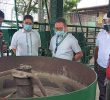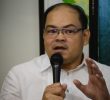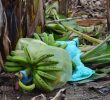DAVAO CITY – Agri-business remained one of the top exports from Southern Mindanao, but weak economic fundamentals have failed to transform this into gains for farmers and agri-workers.
Dr. Rene Ofreneo, a former labor undersecretary and former dean of the University of the Philippines School of Labor and Industrial Relations (UP-Solair), raised this point in a round-table talk last week with farmers and environment groups held in Ateneo de Davao University.
Ofreneo presented a research on the impact of four agri-business companies in Southern and North-Central Mindanao that showed high poverty level.
The study is titled “Impact of Corporate Land Investments in the Philippines: the Mindanao Story” published by the Integrated Rural Development Foundation and Asia-Pacific Network on Food Security.
The research presented the case in North Cotabato province, where Dole-Stanfilco and Sumifru expanded its banana plantations in recent years. Ironically, the province recorded the highest poverty rate in the country with a rate of 43.9% last year.
Dole-Stanfilco expanded its Cavendish banana production in the towns of Makilala, Magpet and Kidapawan City in North Cotabato covering 1,731 hectares. Sumifru expanded to North Cotabato in 2004, and to neighboring South Cotabato and Davao City.
Farmers and small landowners interviewed by the study lamented having lost their stable source of income from rice and corn after entering into agreements with the companies. They also said they only harvest once a year instead of harvesting two to three times a year with rice and corn.
The dip in production of staple foods contributed to the increase of hunger in Region 12, where North Cotabato is situated. Data revealed that from 2009 to 2011 an increase of 10,000 more families reported to suffer from hunger, totaling 90,305.
Ofreneo said these data showed the core problem in government on how it planned for agriculture and food security vis-à-vis neo-liberalization of the economy.
He pointed out that government jumped into the neo-liberal framework of agri-business economy. The government’s Medium-Term Philippine Development Plan for 2005 to 2010 allotted at least two million hectares for agribusiness with a target of creating two to ten million jobs by 2010.
Ofreneo said this raised basic questions in what is government’s vision in agriculture: “is our land for the poor or for the agribusiness and realtors?”
He also posed a question what is government’s priority between agribusiness or food sufficiency. Government statistics showed that agriculture’s contribution to the country’s gross domestic product dipped by 10 percentage points or from 22% to 10% from 1990 to 2010.
He finds it alarming that a dominantly agriculture economy has suffered a net trade deficit of $1 billion.
Another effect is that the peasant sector remained the poorest in the country,accounting to 39% of the country’s poor according to government statistics.
Ofreneo also blamed government for following neo-liberal prescriptions in the World Trade Organization (WTO) and now with the Asean economic integration without looking for preparation.
“Remember, WTO is war, we should have gotten ready. But we just opened up,” he said.
With the lack of fundamentals in agriculture, Ofreneo said this brought such negative impact.
“The lack of industrialization and mechanization as well as the absence of urban-rural linkages has made the Philippine agricultural sector an easy prey to unfair trade practices, which are further aggravated by the unilateral liberalization being undertaken by the administration,” Ofreneo said.
He lamented that the Philippines failed to follow the path of other Asian countries which developed their agriculture to fuel economic growth.
“Successful land reforms in countries like Japan, Korea and Taiwan have shown that the equalizing effect of land redistribution was the necessary foundation to spawn rural development and activate rural industries,” he pointed out.
What Ofreneo wants is a government “roadmap” to ensure the country’s agro-industrial development. These include agrarian reform; transformation of farmers and agrarian reform beneficiaries into modern agribusiness producers; a review of government’s deregulation policy and commitments to WTO; and legislation to address agri-development, food security and self-sufficiency.
His talk came a few days before the Southern Mindanao Growth Corridor Investors Forum, where foreign chambers of commerce expressed interest to invest in the region’s agri-business and bio-technology sectors. (davaotoday.com)










